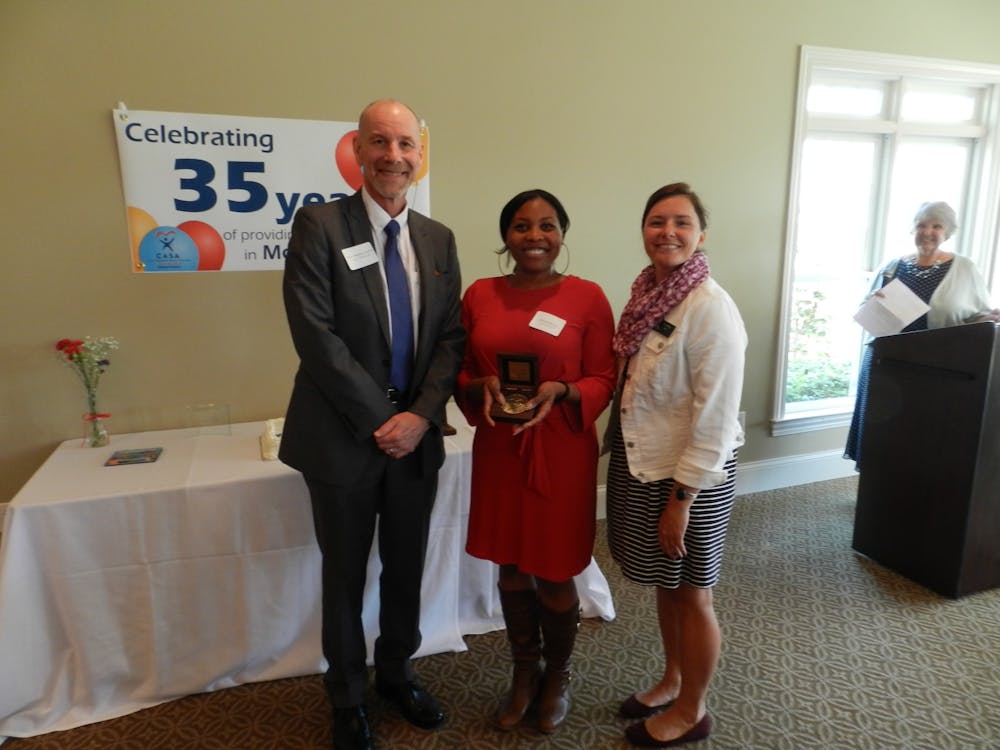Almost 80 Monroe County children are on the waitlist to be assigned to a court appointed special advocate as of Saturday, and the CASA program needs about 50 more volunteers to keep up with that growing list, CASA executive director Kristin Bishay said.
Monroe County CASA is a volunteer-based program that provides representation in juvenile court for child victims of abuse and neglect, Bishay said. Court appointed special advocates, or CASAs, gather information on the children and their families, visit with the children and make suggestions to the judge about what’s best for the kids.
A case can go on without a CASA, but Bishay said this isn’t good for the children. She said there’s usually three parties involved in these cases: the Department of Child Services, the parents and the child. Oftentimes, the case becomes about the parents.
“It’s easy to forget the case is about the child,” Bishay said. “That’s what CASAs are for, someone whose main responsibility is to the child.”
Domestic violence is on the rise during the pandemic, according to a study published in the National Center for Biotechnology Information. Bishay said the cases CASA has seen lately have been greater in quantity and severity. Before the pandemic hit the United States, the organization saw about two to three new cases per month, Bishay said. Now, it sees two to three new cases per week.
A parent may have lost their job, and their children might be at home all day. Quarantine conditions are associated with substance abuse, depression and post-traumatic stress symptoms, according to the study.
Shanker Krishnan, 62, was sworn in as a CASA in early March this year. He said it can be difficult to build a relationship with the children only through virtual visits and to gauge whether the children are OK, but his supervisor and the CASA staff help him solve any problems he may have.
“I never feel like I'm out on my own,” Krishnan said. “I can talk to my supervisors and say, ‘Hey, I don’t know exactly how to do this. Can you help me?’”
Krishnan said being a CASA has taught him about humility.
“Many of us come from privileged backgrounds in the sense that we have a place to stay, we have a family, we are getting an education or are already educated,” he said. “All these things we sort of take for granted.”
Adaliah Brown, 40, has been a CASA for eight years and was recognized as Volunteer of the Year in 2019. Brown said CASA is about bringing humanity to the children’s cases.
“It is my life’s goal that all people feel loved and that all people are given tools, so that they can be great parents and can live abundant lives,” she said.
One of her favorite memories being a CASA was a case in which a young man had been institutionalized for years, and Brown said it seemed like the system had given up on him. She was determined that he finish high school and had some options after graduating. He got his GED and got into a trade program.
Brown said in court, the judge will turn to her and say, “Ms. Brown, I know you have something to say.” She said this is a sign she adds value to court hearings and the cases she works on.
“The work you do, you might not feel so great about it at the time, and you might actually feel like you failed,” Brown said. “But what you do as a CASA impacts people in a big way.”
Marissa Reed, 41, has been a CASA for 10 years. It can be a traumatic experience for kids to have the courts get involved, she said. They probably can’t fully understand what’s happening to them, and they feel the loss if they’re removed from their parents.
“It’s a whirlwind of uncertainty,” Reed said.
She said it’s CASAs’ job to help children to a better place.
Being a CASA is emotional work, but Reed said being emotional doesn’t disqualify someone from being a volunteer.
“I am a very emotional person, and I am somehow able to do it,” she said. “I’m able to, at least for the moment, push the emotions aside and do what I think needs to be done to help these children. I think that a lot of people would probably find that if they gave it a chance.”
Bishay, the program director, said an ideal CASA is a patient person who can work well on a team and be objective about the children’s cases. She also said it’s important that CASAs have a flexible idea of what family looks like.
To become a CASA, people can apply online. Then, they’ll be screened and interviewed, Bishay said. If selected, trainees will get a background check and do about 30 hours of training over multiple weeks. Then they can be sworn in by the judge and assigned to a case.
Bishay estimates the organization will lose about $100,000 this year because it cannot have fundraising events. People can donate to Monroe County CASA on its website.




